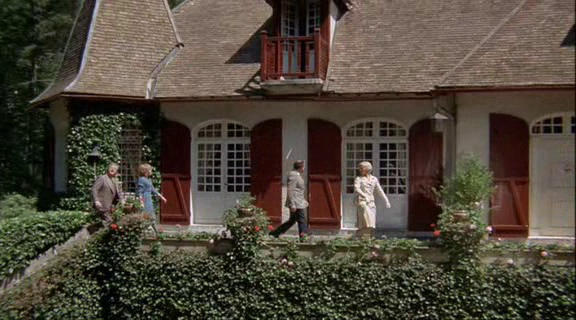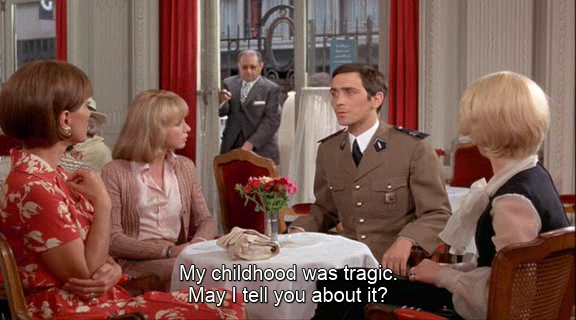1972: Oversharing with "The Discreet Charm of the Bourgeoisie"
 Sunday, April 21, 2019 at 10:45PM
Sunday, April 21, 2019 at 10:45PM TFE will be periodically looking back at the 1972 film year before we hit the Supporting Actress Smackdown next Sunday. Here's Paolo.

This is going to sound like I’m overestimating my writing power but here goes. The symbolism within Luis Buñuel’s The Discreet Charm of the Bourgeoisie, Oscar's Best Foreign Film winner of 1972, is easy to write about. Up to interpretation, as they say. What isn’t easy is writing about the feelings the movie evokes. In short, I might be explaining jokes, which slightly offends me as a fan of comedy. But I’m going to do it anyway, since the humor is the first thing that comes to mind in writing about what is arguably Buñuel’s most personal movie.
The film is about six white bourgeois people who just want to eat but someone or something keeps interrupting them. (I have the same dream... but it's not about food.)
They keep inviting themselves to each other’s houses. Most of the group feel like it’s someone’s turn to host, but each host has convinced themselves that their little get together wasn’t today but tomorrow or some other time. They always overstay their welcome, which exposes the commonalities between these characters’ experience and mine. Another commonality is their insistence on the fashionable. “These are the wrong glasses to drink martinis from,” one character says, which matters to people more than the issues they’re ignoring while drinking from them.

“My childhood was tragic. May I tell you about it,” a stranger asks the bourgeois women. It’s the kind of question one asks once you're a drink or three in, not during a surprisingly sober brunch. But he already brought it up, so he might as well tell the women. Buñuel uses his own dreams and passes it off as this strange character’s. Buñuel is working within a medium that’s inherently sly about oversharing, but he hints at his ambivalence in doing so, anyway.
Another dinner interruption features a battalion coming into one of the homes, reminding audiences that this is 1972, a year when one or two countries were sinking deep into dictatorships. Nobody knew it yet but with every subsequent year, another dictator rises. Buñuel is a traveler, wandering through and working in Mexico and France, which had their own troubles, but this might also remind us of his Spanish roots and the regime in that country. Big trouble is always at the doorstep, waiting for its own invitation.

This dining group were probably kids when the war broke out. Though fate eventually spared them, they were right to assume that what they worked hard to build would be destroyed. These fears are legitimized when they saw a younger generation that held on to political ideologies like communism that they know don't work. Buñuel exaggerates a true version of what this middle aged generation did to restore the status quo. They even had to get their own hands bloody to keep order.
After going through one ridiculous plot point after another, Buñuel eventually returns to the dining group’s central figure and the director's stand-in. Rafael Acosta (Fernando Rey) is the ambassador of Miranda, a fake country. Despite being part of this group and living among the French and speaking like a Frenchman, the crowd still ask him about Miranda, one question more insulting than the last. This is obviously an insight into Buñuel both as a Spaniard and an honorary Frenchman. Even if Rafael, and thus, Buñuel, is in the same economic class as his friends, someone will always remind him that he doesn’t quite belong. This is the most relatable part of the film for me, as someone who comes from two countries run by idiots. But there's always humour in any situation, a philosophy Buñuel expressed through this masterpiece.




Reader Comments (4)
My favorite part of the movie is the dinner scene in the theatre.
Now that you mention the dreams i realize i used to have two recurring types of sleep shown in the movie: walk without rest to a place you never reach and prepare a perfect meal that can not be concluded.
The ostentatious, overdeliberate display of good manners: "Avec plaisir".
I'd have nominated Audran as Supporting Actress but it's years since I saw this.
This is a great movie and a nice read
mark - co-sign.